
Edward Osborne WilsonForMemRS was an American biologist, naturalist, ecologist, and entomologist known for developing the field of sociobiology.
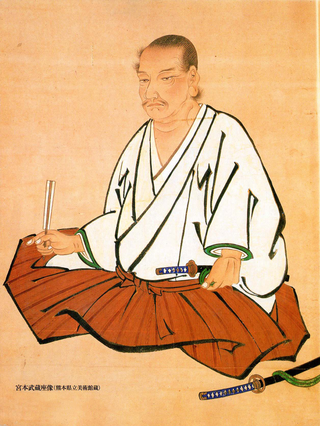
Miyamoto Musashi, also known as Shinmen Takezō, Miyamoto Bennosuke or, by his Buddhist name, Niten Dōraku, was a Japanese swordsman, philosopher, strategist, writer and rōnin, who became renowned through stories of his unique double-bladed swordsmanship and undefeated record in his 61 duels. Musashi is considered a Kensei, a sword-saint of Japan. He was the founder of the Niten Ichi-ryū, or Nito Ichi-ryū, style of swordsmanship, and in his final years authored The Book of Five Rings and Dokkōdō.

Thomas Woodrow Wilson was an American politician and academic who served as the 28th president of the United States from 1913 to 1921. A member of the Democratic Party, Wilson served as the president of Princeton University and as the governor of New Jersey before winning the 1912 presidential election. As president, Wilson changed the nation's economic policies and led the United States into World War I in 1917. He was the leading architect of the League of Nations, and his progressive stance on foreign policy came to be known as Wilsonianism.

The 1912 United States presidential election was the 32nd quadrennial presidential election, held on Tuesday, November 5, 1912. Democratic Governor Woodrow Wilson of New Jersey unseated incumbent Republican President William Howard Taft while defeating former President Theodore Roosevelt and Socialist Party nominee Eugene V. Debs.

The 1916 United States presidential election was the 33rd quadrennial presidential election, held on Tuesday, November 7, 1916. Incumbent Democratic President Woodrow Wilson narrowly defeated former associate justice of the Supreme Court Charles Evans Hughes, the Republican candidate.
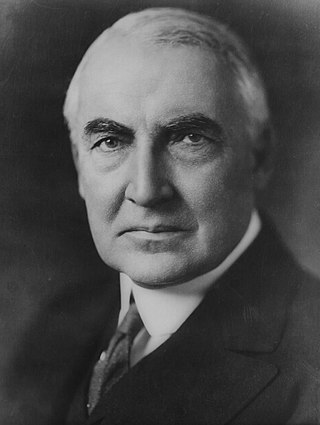
The 1920 United States presidential election was the 34th quadrennial presidential election, held on Tuesday, November 2, 1920. In the first election held after the end of the First World War and the first election after the ratification of the Nineteenth Amendment, Republican Senator Warren G. Harding of Ohio defeated Democratic Governor James M. Cox of Ohio. It was also the third presidential election in which both major party candidates were registered in the same home state; the others have been in 1860, 1904, 1940, 1944, and 2016.

William Jennings Bryan was an American lawyer, orator, and politician. Beginning in 1896, he emerged as a dominant force in the Democratic Party, running three times as the party's nominee for President of the United States in the 1896, 1900, and 1908 elections. He served in the House of Representatives from 1891 to 1895 and as the Secretary of State under Woodrow Wilson from 1913 to 1915. Because of his faith in the wisdom of the common people, Bryan was often called "the Great Commoner", and because of his rhetorical power and early fame as the youngest presidential candidate, "the Boy Orator".

Henry Wilson was an American politician who was the 18th vice president of the United States from 1873 until his death in 1875 and a senator from Massachusetts from 1855 to 1873. Before and during the American Civil War, he was a leading Republican, and a strong opponent of slavery. Wilson devoted his energies to the destruction of "Slave Power", the faction of slave owners and their political allies which anti-slavery Americans saw as dominating the country.
Peter Lamborn Wilson was an American anarchist author and poet, primarily known for his concept of Temporary Autonomous Zones, short-lived spaces which elude formal structures of control. During the 1970s, Wilson lived in the Middle East, where he explored mysticism and translated Persian texts. Starting from the 1980s he wrote numerous political writings under the pen name of Hakim Bey, illustrating his theory of "ontological anarchy".

Yagyū Munenori was a Japanese daimyo, swordsman, and martial arts writer, founder of the Edo branch of Yagyū Shinkage-ryū, which he learned from his father Yagyū "Sekishūsai" Muneyoshi. This was one of two official sword styles patronized by the Tokugawa shogunate. Munenori began his career in the Tokugawa administration as a hatamoto, a direct retainer of the Tokugawa house, and later had his income raised to 10,000 koku, making him a minor fudai daimyō, with landholdings around his ancestral village of Yagyū-zato. He also received the title of Tajima no Kami (但馬守).
William Julius Wilson is an American sociologist, a professor at Harvard University, and an author of works on urban sociology, race, and class issues. Laureate of the National Medal of Science, he served as the 80th President of the American Sociological Association, was a member of numerous national boards and commissions. He identified the importance of neighborhood effects and demonstrated how limited employment opportunities and weakened institutional resources exacerbated poverty within American inner-city neighborhoods.
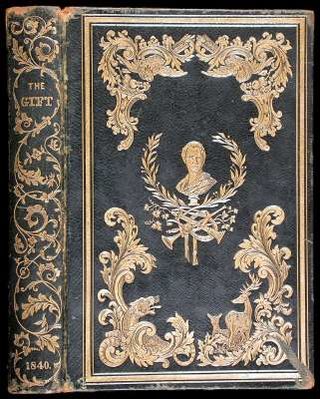
"William Wilson" is a short story by American writer Edgar Allan Poe, first published in 1839 in The Gift, with a setting inspired by Poe's formative years on the outskirts of London. The tale features a doppelgänger. It also appeared in the 1840 collection Tales of the Grotesque and Arabesque, and has been adapted several times.

The underclass is the segment of the population that occupies the lowest possible position in a class hierarchy, below the core body of the working class.
The 1920 Democratic National Convention was held at the Civic Auditorium in San Francisco, California from June 28 to July 6, 1920. It resulted in the nomination of Governor James M. Cox of Ohio for president and Assistant Secretary of the Navy Franklin D. Roosevelt from New York for vice president. The 1920 Democratic National Convention marked the first time any party had held its nominating convention in a West Coast city.

William Edward Wilson was an American educator, businessman, and politician from Indiana. He served one term in the United States House of Representatives (1923–1925).
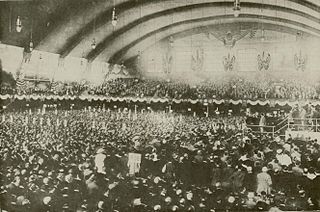
The 1912 Democratic National Convention was held at the Fifth Regiment Armory off North Howard Street in Baltimore from June 25 to July 2, 1912.
Edgar Bright Wilson Jr. was an American chemist.

James Wilson was a Scottish-born American Founding Father, legal scholar, jurist, and statesman who served as an associate justice of the United States Supreme Court from 1789 to 1798. Wilson was elected twice to the Continental Congress, was a signatory of the Declaration of Independence, and was a major participant in drafting the U.S. Constitution becoming one of only six people to sign both documents. A leading legal theorist, he was one of the first four Associate Justices appointed to the Supreme Court by George Washington. In his capacity as the first professor of law at the College of Philadelphia, he taught the first course on the new Constitution to President Washington and his Cabinet in 1789 and 1790.
The 1875 Rangitikei by-election was a by-election held on 24 April 1875 during the 5th New Zealand Parliament in the Rangitikei electorate on the West Coast of the North Island.
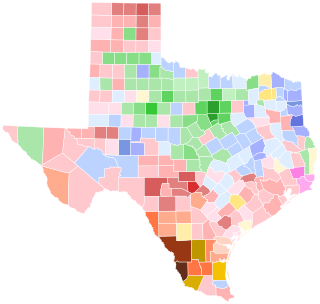
The 1961 United States Senate special election in Texas was held on May 27, 1961. The election was held to replace outgoing Senator Lyndon B. Johnson, who had been elected Vice President of the United States.















